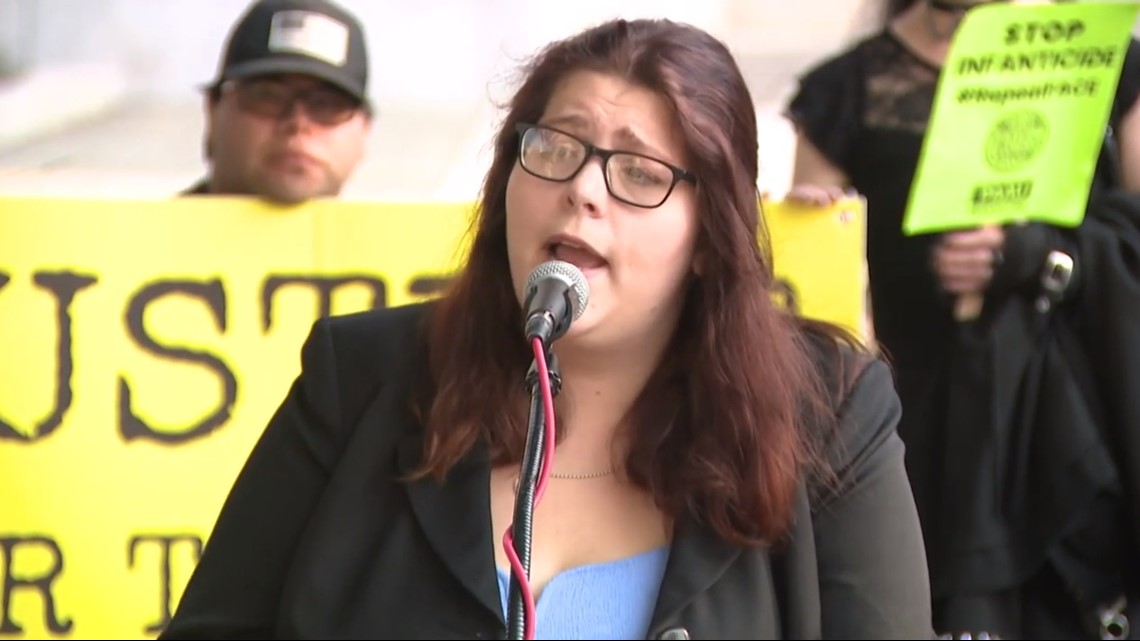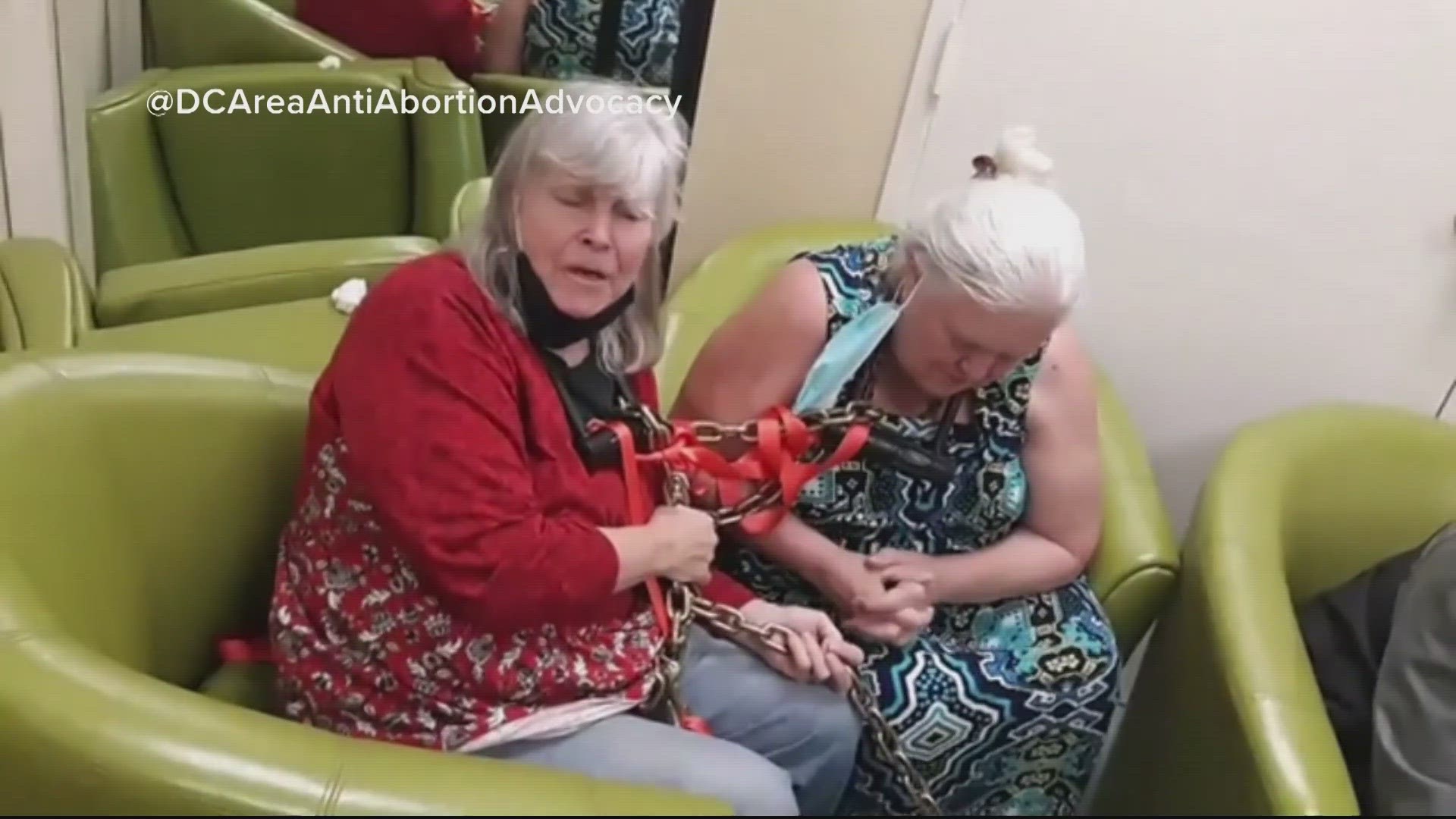WASHINGTON — Federal prosecutors urged jurors on Thursday to find five anti-abortion activists had knowingly broken the law in 2020 as part of a conspiracy to blockade a D.C. clinic.
The jury heard closing arguments Thursday after a week of testimony in the trial of the first of two groups of defendants accused of plotting to occupy the Washington Surgi-Clinic in October 2020 and prevent patients from accessing reproductive health services. Assistant U.S. Attorney John Crabb said the lead defendant, Lauren Handy, had planned what she described as a “lock and block rescue” and recruited other anti-abortion activists from around the country to participate. Handy and nine others were indicted last year on felony charges of violating the Freedom of Access to Clinic Entrances (FACE) Act and conspiracy against rights.
In his closing, Crabb highlighted testimony from a distraught patient at the clinic who begged the activists to let her in and ultimately climbed through a receptionist’s window to evade them.
“No one, not these defendants, not anyone else, has the right to impinge on anyone else’s rights,” Crabb added.
In surveillance video, members of the anti-abortion group can be seen forcing their way into the clinic after the door was opened for Handy, who had made an appointment under a fake name. Several of the defendants, including one in the first trial group, John Hinshaw, then moved chairs in front of the door from the waiting area into the clinic and used ropes and chains to tie themselves together to form a human blockade. Others, including defendants Heather Idoni and William Goodman, went out into the hallway and stood in front of or kneeled next to an employee-only entrance. Idoni, who took the stand in her own defense, denied blocking the door – although in body-worn camera video she can be heard refusing to allow a police officer to bring a patient into the clinic and saying she would only let people exit the facility.
Attorneys for Handy had hoped to enter as evidence an undercover video filmed in 2012 they claimed showed the clinic’s doctor admitting he would not provide aid to a child born alive after an abortion proceeding. But U.S. District Judge Colleen Kollar-Kotelly barred that video from trial, calling it “propaganda.” Handy, who also took the stand, was limited to a description of how the video had affected her life and her beliefs about what might be happening at the clinic. Her attorney, Martin Cannon, of the anti-abortion law firm The Thomas Moore Society, argued that belief warranted a not guilty verdict.
“In Lauren’s mind, any person she can prevent from going into that clinic is a person whose baby will not be born alive and left to die,” Cannon said.
Cannon acknowledged the case involved conduct by some individuals that could violate the FACE Act, but denied any of it could be attributed to Handy.
“[FACE] leaves untouched the bulk of predictable, perhaps unpopular – even intrusive – activism that can be engaged in by people on both sides of this issue,” Cannon said.


But prosecutors said Handy’s conduct extended beyond planning and talking to police and into actions prohibited by the law. During his closing arguments, Crabb showed surveillance video of Handy moving a chair into the clinic’s main entrance and securing it there with a rope tied to other furniture inside.
During their closing arguments, the remaining defendants largely either adopted Handy’s claims about how the video had impacted their beliefs or said the government had failed to prove its case.
In Geraghty’s case, prosecutors described him as a co-planner of the blockade who had hidden in a stairwell with others and then entered a clinic where he was clearly unwelcome. His attorney, John Kiyonaga, described him instead as a concerned citizen who was attempting to peacefully share his beliefs with women seeking treatment at the clinic.
“Herb Geraghty was there to entreat, not to bludgeon,” Kiyonaga said.
Kiyonaga also said Geraghty had attempted to help a woman who’d collapsed on the floor outside the clinic by suggesting she should call 911. The woman, who testified under a pseudonym, said she’d come to the clinic because of a fetal abnormality likely incompatible with life and had collapsed on the ground while her husband begged the anti-abortion activists to let them inside the clinic. While he was on the stand, prosecutors had elicited from Geraghty that he’d told the woman the clinic wasn’t providing services at that time.
“The audacity of that!” Crabb said. “They weren’t providing the service because he and his co-conspirators were blocking them.”
Alfred Guillaume, who represented Hinshaw, said there was no denying the video showed his client blocking a door with his body. But he said the chains were not attached to his client unlike other defendants – only looped around his legs – and were “more symbolic” than obstructive.
Robert Dunn, representing Idoni, also didn’t deny video showed his client in front of a door. He did deny she had blocked the woman who collapsed on the floor from entering, although during cross-examination of Geraghty prosecutors elicited that someone dressed just like Idoni was visible on surveillance video in front of the woman in the hallway.
Finally, attorney Howard Walsh emphasized the relative lack of evidence about his client, Goodman’s, participation in any planning. He acknowledged surveillance video showed Goodman dropping the bag with locks and chains in the hallway, but said he had no idea what was inside and “recoiled” immediately when another defendant pulled out a bock lock. Walsh said Goodman’s role in the day’s events amounted to nothing more than “kneeling and praying at an abortion clinic.”
Jurors were ordered to return Friday morning for final instructions before beginning deliberations. Each defendant in the case faces two felony counts: violating the FACE Act and conspiracy against rights. If convicted, they could potentially face a recommended sentencing guideline of several years in prison.

